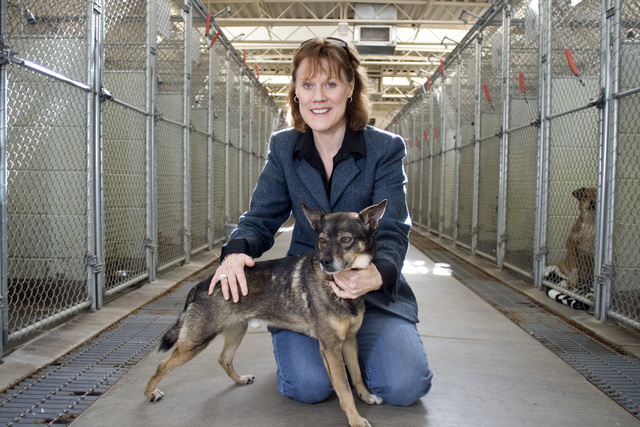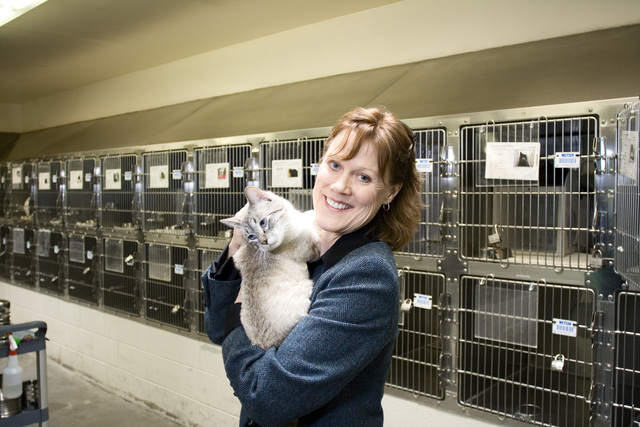Our Own Backyard
Although Bruin has never directed a shelter before, she’s familiar with animal issues in the state. Until she was appointed to this position, she served on the Animal Humane Association of New Mexico’s board of directors, and she still sits on the New Mexico Attorney General’s Animal Cruelty Task Force. She started working with AHA about six years ago as a volunteer, eventually becoming involved with fundraising and, later, policy decisions. Bruin’s real work experience is public administration and law, a field she’s been in for 30 years, including a stint as a prosecutor. The Alibi sat down with Bruin during her third week on the job. Most of her time thus far has been spent acquainting herself with the position and the issues, but she says she has some plans she wants to institute immediately. She says her experience as a prosecutor will be a great asset to the shelters, not only because of her contacts, but because she also plans to crack down on animal cruelty cases. She cites a case from the fall, when a woman and her husband were found guilty of keeping a Great Dane locked in a crate for its whole life. The crate was so small it deformed the animal, making it unable to walk. The couple was sentenced to community service at the shelters. To Bruin, that punishment is ridiculous, and people convicted of animal cruelty should never be allowed around animals. Instead, she says she’ll try to get such cases “prosecuted by the full extent of the law.”The fact that Bruin hasn’t run a shelter before is unnerving to some animal advocates, who have for years been asking the city to hire a nationally acclaimed shelter director. Debbra Colman is the president of the Alliance for Albuquerque Animals, a group dedicated to improving the lives of shelter animals. Colman founded the organization after doing consulting work at the shelters between 2003 and 2004. After Berry was elected, the Alliance offered the city $25,000 to do a nationwide search for a director, Colman says, and she was disappointed when it wasn’t taken.“In my view, it would have been the best thing to do a nationwide search to get one of the top 10 directors in the country in Albuquerque,” she says. “The salary is over $100,000. We could have found one of them.”The city’s director of communications, Chris Ramirez, says he doesn’t know about the Alliance’s offer but that Berry “isn’t big” on national searches. “We know we have excellent, qualified people in New Mexico,” Ramirez says. He adds that Bruin was hired because of her skill set, which includes budgeting, policy and administration.Colman says that so far she’s been impressed during her interactions with Bruin. “I sent a dozen e-mails to Jeanine [Patterson, the last shelter director] over her first year and a half, and she never returned one of them,” Colman says. “Bruin has responded to every e-mail I’ve sent.” Due to Bruin’s availability, and based off a two-hour discussion they had about the shelters, Colman says she’s “cautiously optimistic” about her, even though she wasn’t picked from a national pool.Strays and Spays
Bruin’s biggest priority is increasing spays and neuters in the city. “There are more animals than good homes,” she says, and although the HEART Ordinance has helped increase the procedures, it’s not enough. The shelters already have a program in place that makes free spay/neuter services available to low-income households. (One-person households must make $18,950 or less to qualify, while eight-person families, for instance, must make $35,750 or less.) Bruin’s looking to add a voucher program, which would allow people to take a voucher to a veterinarian outside the shelters for a free spay/neuter. The vouchers would be good with any vet who’s signed on to the program, and Bruin says the program would be open to all of them. She’s also working with animal groups in town to get the word out. She’d like to get the program functioning before spring, when the number of animals that end up at the shelters rises.There are some things Bruin says she would like to do once money becomes available, starting with significantly increasing the number of kennel staff (a move local animal groups have been demanding for a decade). But there are other things she can do right away, she adds, like hiring a volunteer coordinator. The number of volunteers at the shelters dwindled in the past few years. Having volunteers is critical for the shelter, she says, because they can help do all the things staff members don’t have time for, like socializing animals. She also hopes to find people who can foster animals, which is a good strategy for dealing with pregnant strays or puppies and kittens that are too young to be adopted, she says. Additionally, behavior testing and adoption counseling at the shelters are minimal. Although the budget is tight, she’d like to start increasing both in the coming months.Bruin says she’s still learning about all the issues at the shelters. But in visiting both locations every day, she’s been impressed with what she’s seen. Problems do exist, but “the kennels seem clean and well-cared for,” Bruin says, and she’s eager to work with animal welfare groups to get things done. She seems to agree with a sentiment voiced by Colman: “Everybody has something to bring to the table, and we need to find a way to bring everybody to the table.”If you’re interested in volunteering at the shelters, or if you’d like more information on the shelters’ low-income spay/neuter program, call the city’s Citizen Contact Center at 311.





